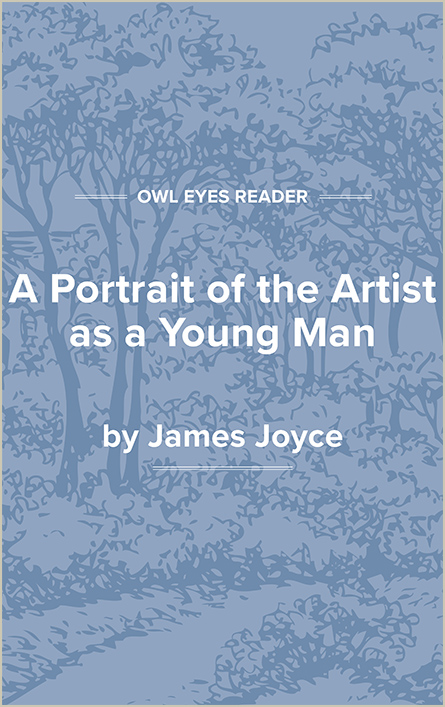Study Guide
Analysis Pages
Summary
A Portrait of the Artist as a Young Man is a bildungsroman, a novel of education; in this case, it is the growth of the artist from his earliest childhood to his declaration of his proper role as an artist, a “priest of the eternal imagination.” The novel begins with the earliest experience of the protagonist, Stephen Dedalus. His world is a world of sensations, especially of touch and smell. Later those sensations will be connected to words, and by the end of the book he recognizes that words have an independent existence. He also recognizes the demands that he submit, to “apologize,” as his father and Aunt Dante demand. Throughout the novel, Stephen is continually evading most of the demands that are placed on him. An artist must be free.
The next section takes place at a Jesuit boarding school, Clongowes; the concluding incident in the chapter also takes place there. Stephen had lost his glasses and was, therefore, unable to do his lesson. Father Dolan, however, refuses to accept his explanation. Stephen goes to the rector, Father Conmee, to seek redress. Conmee at first suggests that Father Dolan did not know of the lost glasses, but Stephen insists that he did know. Finally, Conmee reluctantly agrees to order Dolan not to punish Stephen the next day. The chapter ends with Stephen declared a hero by his classmates; he now feels “happy and free.” Each chapter of the book ends in some kind of triumph for Stephen. The beginning of the following chapters, however, shows a decline.
The second chapter continues the development of Stephen as he experiences a change in his situation. His father’s finances decline and he leaves Clongowes and becomes a day student at another Jesuit school, Belvedere. He also begins to be interested in women. He is involved with the young Ellen and dreams about the fictional Mercedes, who will initiate and transform him. He imagines an encounter with Mercedes when “weakness and timidity and inexperience would fall from him.” Stephen’s initiation, however, is more sordid. He feels lust rather than love and wishes to fall into sin with a real woman and not an idealized figure from fiction. He goes to the red-light district of Dublin to seek that encounter. The chapter ends with Stephen and a prostitute. She embraces him, and he feels “joy and relief.” He will not, however, kiss her; he wishes to retain his aloof independence but finally surrenders and submits. It is, however, a necessary fall; Joyce’s artist must fall in order to create “life out of life.”
The beginning of the chapter is a decided decline. Stephen does not feel transformed but degraded by his sexual encounter. He feels like a beast instead of a man. Then a retreat is announced at school; Stephen is to hear powerful sermons by a Jesuit. He is immediately affected; he feels that the words are aimed directly at him. He also thinks of a way out; the Virgin will take his hand and that of an innocent young girl, Emma, and lead him to forgiveness and an innocent love. It will not, however, be that easy for Stephen; he is forced to confront his sin and his fate by the Jesuit preacher. The preacher speaks of hell and its terrible punishments. He cites the condemnation of Lucifer, who, like Stephen, will not serve or submit. His description of hell sounds remarkably like Clongowes. The smells and companions of the preacher’s hell are exactly like Stephen’s memories of his first school. The effect on Stephen is immediate. He calls for help that evening in his bedroom and vomits in disgust at what he has done. He believes that he has lost his innocence and turned himself into a beast. He confesses his sin and once more submits, although this time it is to the Church rather than a prostitute. The last scene of the chapter parallels the earlier one; he takes the host as he had taken the kiss. Yet the Church is not to be Stephen’s final choice; it is only a stage in his development.
There is a marked change in the...
(The entire page is 1,335 words.)
Owl Eyes subscribers get unlimited access to our expert annotations, analyses, and study guides on your favorite texts. Master the classics for less than $5/month!

